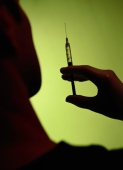Surge in needle use in rural Indiana linked to inappropriate prescribing of opioid medications
MONDAY, June 29, 2015 (HealthDay News) — Allowing needle-exchange programs is one way to curtail the recent HIV outbreak in rural Indiana, according to a viewpoint piece published online June 24 in the New England Journal of Medicine.
Noting that needle-exchange programs are illegal in Indiana, Steffanie A. Strathdee, Ph.D., from the University of California in San Diego, and Chris Beyrer, M.D., M.P.H., from the Johns Hopkins Bloomberg School of Public Health in Baltimore, discuss the recent HIV epidemic outbreak that occurred in Scott County.
The authors note that those diagnosed with HIV in the Indiana outbreak were young and white, and about half were women, a demographic that mirrors the trend of the current heroin epidemic. Needles are in short supply in Indiana, and using needles for nonmedical purposes is a felony. On March 26, 2015, Governor Mike Pence issued an executive order declaring a state of emergency, suspending this law, and allowing needle-exchange programs to operate. Substance-use treatment remains inadequate in rural Indiana; Indiana’s delayed expansion of Medicaid has impeded access to drug treatment. In addition, Indiana has suboptimal coverage of HIV and hepatitis C virus testing, delaying treatment uptake. The outbreak was also related to inappropriate prescribing of opioid medications, which is common in many states.
“We believe that threading the needle to prevent further HIV outbreaks among substance users requires aggressive implementation of evidence-based practices for HIV prevention,” the authors write. “Permanently lifting the ban on using federal funds to support needle-exchange programs will be a critical component of HIV prevention, since these programs reduce HIV incidence and front-line exchange workers are often the first people injection-drug users reach out to for help.”
Full Text
Copyright © 2015 HealthDay. All rights reserved.








